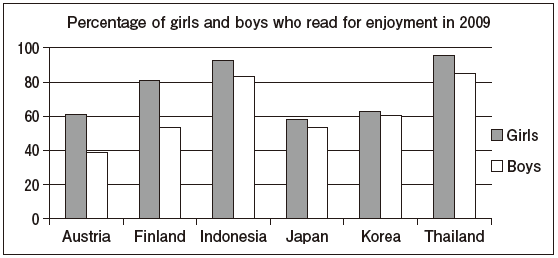You are doing research on students’ reading habits. You found two articles.
Reading Habits Among Students
by David Moore
July, 2010
Reading for pleasure is reading just for fun rather than for your school assignment or work. There is strong evidence linking reading for enjoyment and educational outcomes. Research has shown that students who read daily for pleasure perform better on tests than those who do not. Researchers have also found that reading for fun, even a little every day, is actually more beneficial than just spending many hours reading for studying and gathering information. Furthermore, frequent reading for fun, regardless of whether reading paper or digital books, is strongly related with improvements in literacy.
According to an international study, in 2009, two-thirds of 15-year-old students read for enjoyment on a daily basis. The graph shows the percentage of students who read for enjoyment in six countries. Reading habits differed across the countries, and there was a significant gender gap in reading in some countries.
 In many countries, the percentage of students who read for enjoyment daily had decreased since the previous study in 2000. Back in 2000, on average, 77% of girls and 60% of boys read for enjoyment. By 2009, these percentages had dropped to 74% and 54%, respectively.
In many countries, the percentage of students who read for enjoyment daily had decreased since the previous study in 2000. Back in 2000, on average, 77% of girls and 60% of boys read for enjoyment. By 2009, these percentages had dropped to 74% and 54%, respectively.
In my opinion, many students today do not know what books they should read. They say that they have no favorite genres or series. That’s why the percentage of students who read for pleasure daily has been decreasing. Parents and teachers should help students find interesting books in order to make reading for pleasure a daily routine.
Opinion on “Reading Habits Among Students”
by Y. T.
August, 2010
As a school librarian, I have worked in many different countries. I was a little sad to learn that fewer students around the world read for enjoyment daily than before. According to David Moore’s article, approximately 60% of female students in my home country reported they read for enjoyment, and the gender gap is about 20%. I find this disappointing.
More students need to know the benefits of reading. As David Moore mentioned, reading for pleasure has good effects on students’ academic skills. Students who regularly read many books get better scores in reading, mathematics, and logical problem solving. Also, reading for enjoyment has positive effects on students’ mental health. Research has shown a strong relationship between reading for fun regularly and lower levels of stress and depression.
Regardless of these benefits, students generally do not spend enough time reading. Our daily lives are now filled with screen-based entertainment. Students spend a lot of time playing video games, using social media, and watching television. I think students should reduce their time in front of screens and should read books every day even for a short time. Forming a reading habit in childhood is said to be associated with later reading proficiency. School libraries are good places for students to find numerous resources.
問1 Neither David Moore nor the librarian mentions ( ).
1. gender differences in reading habits
2. problems connected with reading digital books
3. the change in reading habits among students
4. the importance of reading regularly in childhood
問2 The librarian is from ( ).
1. Austria
2. Finland
3. Japan
4. Korea
問3 According to the articles, reading for pleasure has good effects on students’ ( ). (You may choose more than one option.)
1. choice of career
2. educational success
3. mental well-being
4. views of social media
問4 David Moore states that students 24 , and the librarian states that they ( ). (Choose a different option for each box.)
1. are busier than ever before
2. cannot decide what books to read
3. choose similar books as their parents
4. enjoy playing with electronic devices
5. get useful information from TV
問5 Based on the information from both articles, you are going to write a report for homework. The best title for your report would be “( ).”
1. Like It or Not, Reading Classic Novels is Important
2. Make Reading for Entertainment a Part of Your Daily Life
3. Pleasure Reading is Becoming Popular in Different Countries
4. School Libraries: Great Resources for Doing School Projects
【解説】問1 正解率 48.4%
問題問1 Neither David Moore nor the librarian mentions ( ).
David Moore も the librarian も、どちらも言っていないことを選べばよいです。
1. gender differences in reading habits
「読書習慣の性別による違いがあります。」
David Moore はグラフの直前にこう言っています。
「いくつかの国で性別による隔たりがあります」
the librarian も、第一段落の終わりこう言っています。
「性別による隔たりがおよそ20%あります」
どちらも言っていますので、この選択肢はダメです。
3. the change in reading habits among students
「学生間の読書習慣の変化」
David Moore がグラフの後で、こう言っています。
「2000年にした前の調査から、日々楽しんで読書をする学生の割合が減っている」
ということで、この選択肢もダメです。
4. the importance of reading regularly in childhood
「子供時代の定期的な読書の重要性」
the librarian が最後の段落で、こう言っています。
「子供時代に読書習慣をつけることは、後の読書能力に関連すると言われています」
ということで、この選択肢もダメです。
2. problems connected with reading digital books
「電子書籍を読むことに関連した問題」
David Moore が regardless of whether reading paper or digital books と言っていましたが、これは「紙の本でも電子書籍でもいいから本を読んだ方がいい」という話です。
problem ではありませんから、言ったことにはなりません。ということで、正解は「2」です。
言ったことではなく、言わなかったことですから、「消去法」で選ぶしかないですね。
【解説】問2 正解率 68.2%
問題問2 The librarian is from ( ).
The librarian がどこの国の人かを選べばいいです。
The librarian は第一段落で、こう言っています。
「母国の女子学生の約60%が、楽しみのために読書をしていると報告している」
まず、この時点でグラフを確認すると、「Austria」「Japan」「Koria」に絞れます。
そしてその続きにこうあります。
「性別の隔たりが20%あります」
これは Austria ですので、正解は「1」です。
【解説】問3 正解率 59.7%
問題問3 According to the articles, reading for pleasure has good effects on students’ ( ). (You may choose more than one option.)
読書を楽しむと、学生にどういう良い効果があるのか、を選べばよいです。ただ、この問題のいやらしいのは、正解がいくつあるか分からないという点です。
David Moore は第一段落で、こう言っています。
「読書を楽しむことと教育的成果を結びつける強力な証拠があります」
選択肢の 2. educational success がこれに当てはまります。
the librarian が第二段落で、こう言っています。
「読書を楽しみむことは学生のメンタルヘルスに良い影響を与えます」
選択肢 3. mental well-being がこれに当てはまります。
1. choice of career
4. views of social media
といった残りの選択肢ですが、そんなことは書いてありませんでした。
social media に関しては the librarian が、それに時間を取られて、読書する時間が無くなっている…… と嘆いていましたが、それくらいです。「social media の見方」にいい影響を及ぼすなんて話はありませんでしたね。
ということで、正解は「2 と 3」です。
【解説】問4 正解率 49.8%
問題問4 David Moore states that students ( A ), and the librarian states that they ( B ). (Choose a different option for each box.)
David Moore の主張と、the librarian の主張をそれぞれ選べばよいです。
これは消去法でやってもいいのですが、できたら直接正解を見つけてもらいたいです。というのも選択肢の数が多いことと、David Moore と、the librarian の二人分ありますので、二度手間三度手間になる可能性があるからです。
1. are busier than ever before
「以前よりも忙しい」
the librarian は screen-based entertainment に時間を取られているとは言っていますが、「忙しくなった」とは言っていないんですよね。
2. cannot decide what books to read
「何を読むべきか決められない」
David Moore が最終段落で、こう言っています。
「多くの学生は何の本を読むべか知らない」
ということで、( A ) に入るのが「2」です。
3. choose similar books as their parents
「両親と似たような本を選ぶ」
David Moore が「学生が面白い本を見つける手助けを、親や先生はするべきだ」と言っていましたが、こんな話はありませんでしたね。
4. enjoy playing with electronic devices
「電子機器で遊ぶことを楽しむ」
the librarian は最終段落でこう言っています。
「学生はビデオゲームのプレイ、ソーシャルメディアの使用、テレビの視聴に多くの時間を費やしています」
ということで、( B ) に入るのが「4」です。
5. get useful information from TV
「テレビから役に立つ情報を得る」
the librarian が「テレビを見すぎている」と言っていましたが、こういう話はありませんでしたね。
【解説】問5 正解率 69.8%
「両方の記事の情報に基づいて、宿題のレポートを作成します。 レポートに最適なタイトルは ( ) です。」
1. Like It or Not, Reading Classic Novels is Important
「好きかそうでないかにかかわらず、古典的な小説を読むことは重要です」
2. Make Reading for Entertainment a Part of Your Daily Life
「娯楽のための読書を日常生活の一部にする」
3. Pleasure Reading is Becoming Popular in Different Countries
「読書を楽しむことは、いろいろな国で人気になっています」
4. School Libraries: Great Resources for Doing School Projects
「学校図書館:学校プロジェクトを行うための優れた資源」
二人に共通しているのは「毎日本を読みなさい」ということですから、正解は「2」です。



コメントをどうぞ